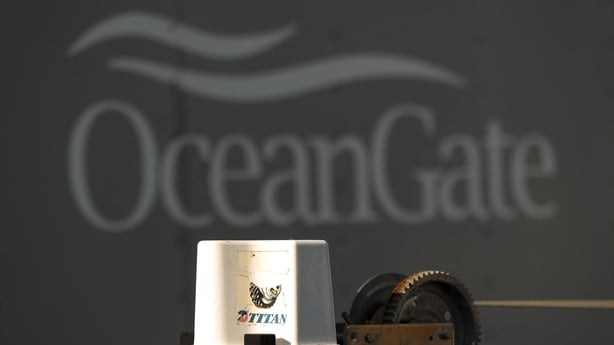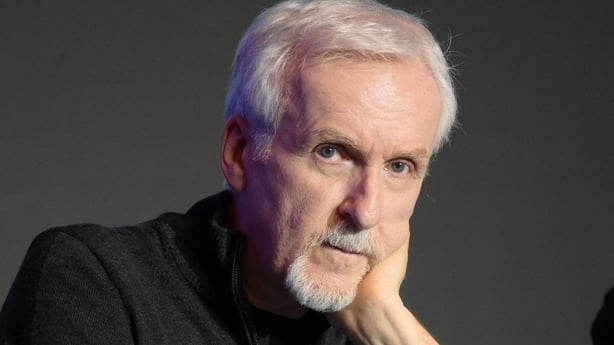The former business partner of Titanic submersible pilot Stockton Rush has said that they put safety first when they co-founded their deep-sea exploration company.
'Titanic' movie director James Cameron has accused OceanGate Expeditions of ignoring safety warnings, following the loss of the Titan submersible with five people on board.
Guillermo Soehnlein, who started OceanGate with Mr Rush before leaving the company in 2013, said he was not involved in the design of the Titan submersible, but denied his old friend was reckless.
"He was extremely committed to safety," he told Britain's Times Radio.
"He was also extremely diligent about managing risks, and was very keenly aware of the dangers of operating in a deep ocean environment.
"So that's one of the main reasons I agreed to go into business with him in 2009."

Mr Soehnlein noted that Mr Cameron himself had conducted many submersible descents, including more than 30 to the Titanic site in the North Atlantic, and to the Earth's deepest point in the Pacific Mariana Trench.
"I think he was asked about a similar risk and he said, 'look, if something happens at that depth, it will be catastrophic in a matter of microseconds.'"
"To the point where the implosion happens at almost supersonic speeds and you'd basically be dead before your brain could even process that anything was wrong."
Mr Soehnlein stressed, however, that it was too soon to say what happened to the Titan, and that it was "tricky to navigate" to formulate global regulations for submersibles designed to go ultra deep.
But deep-sea exploration should continue despite the tragedy, he said.
"Just like with space exploration, the best way to preserve the memories and the legacies of these five explorers is to conduct an investigation, find out what went wrong, take lessons learned and then move forward."
Read More:
US Navy detected submersible implosion: report
Titan sub: What is a 'catastrophic implosion'?
Mr Cameron said yesterday that he wished he had sounded the alarm earlier about the submersible, saying he had found the hull design risky.
He is part of the small and close-knit submersible community, or Manned Underwater Vehicle (MUV) industry. When he heard, as many in the industry had shared, that OceanGate was making a deep-sea submersible with a composite carbon fiber and titanium hull, Mr Cameron said he was sceptical.
"I thought it was a horrible idea. I wish I'd spoken up, but I assumed somebody was smarter than me, you know, because I never experimented with that technology, but it just sounded bad on its face," Mr Cameron told Reuters.

The US Coast Guard said the submersible appears to have imploded on its expedition to the wreckage of the Titanic on the bottom of the North Atlantic, but a conclusive investigation will take time.
A secret US Navy acoustic detection system recorded "an anomaly consistent with an implosion or explosion in the general vicinity of where the Titan submersible was operating when communications were lost," the Navy told the Wall Street Journal.
Mr Cameron said his sources reported similar information and he knew the submersible was lost from the start of the four-day ordeal, suspecting it imploded at the time the Titan's mothership lost communications with and tracking of the submersible one hour and 45 minutes into the mission.
"We got confirmation within an hour that there had been a loud bang at the same time that the sub comms were lost. A loud bang on the hydrophone. Loss of transponder. Loss of comms. I knew what happened. The sub imploded," Mr Cameron said.
He added that he told colleagues in an email on Monday, "We've lost some friends," and, "It's on the bottom in pieces right now."
The five who died mark the first deep-sea fatalities for the industry, Mr Cameron said.
The industry standard is to make pressure hulls out of contiguous materials such as steel, titanium, ceramic or acrylic, which are better for conducting tests, Mr Cameron said.
"We celebrate innovation, right? But you shouldn't be using an experimental vehicle for paying passengers that aren't themselves deep ocean engineers," Mr Cameron said.
He said both the Titanic and the Titan tragedies were preceded by unheeded warnings. In the Titanic's case, the captain sped across the Atlantic on a moonless night despite being told about icebergs.
"Here were are again," Mr Cameron said. "And at the same place. Now there's one wreck lying next to the other wreck for the same damn reason."

